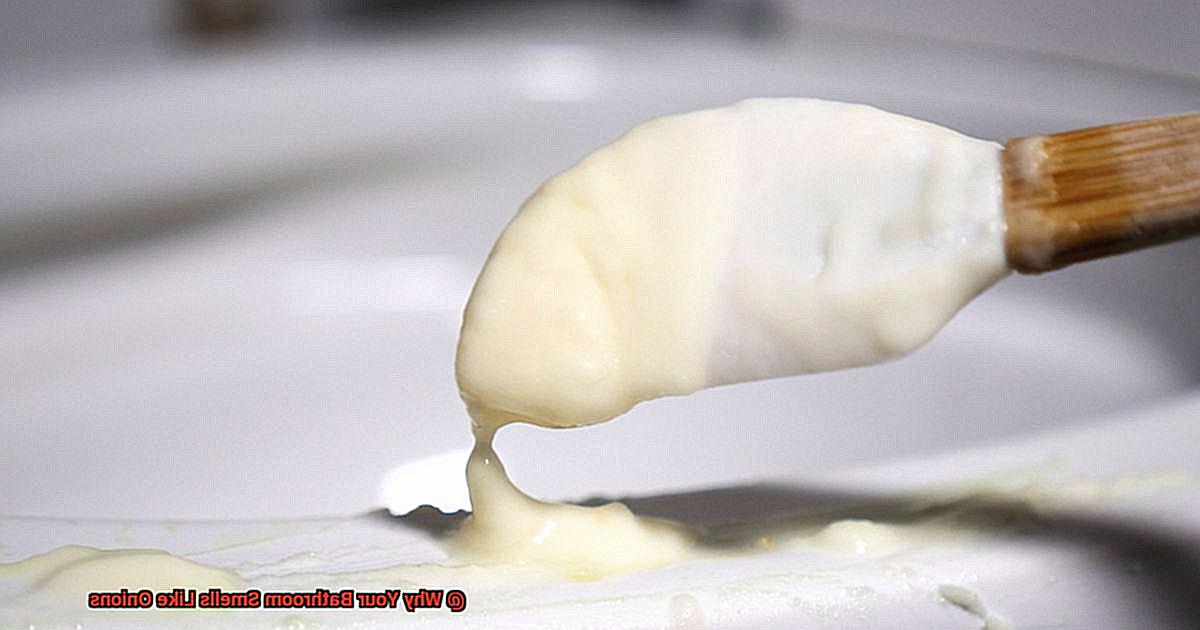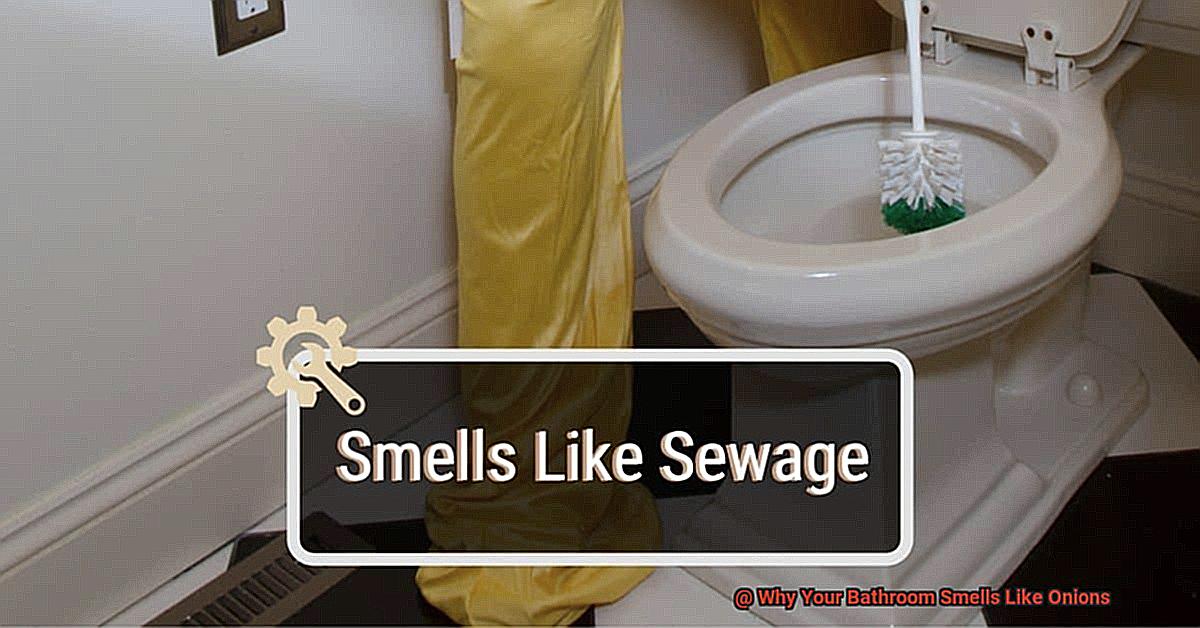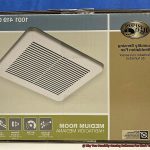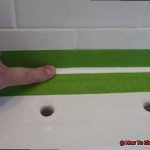Have you ever been caught off guard by the overpowering aroma of onions in your bathroom?
It’s an unpleasant scent that can be confusing, especially when there are no onions in sight. But fear not, this is a common occurrence and we’re here to help solve the mystery.
To understand why your bathroom smells like onions, we first need to know what causes the distinct odor of onions. Sulfur compounds are responsible for their pungent smell, which can linger in the air and on surfaces.
So, what could be causing this peculiar phenomenon in your bathroom? One possibility is a leak in your plumbing system.
If sulfurous gases escape through a crack in your pipes, it could lead to the smell of onions permeating throughout your bathroom. Another explanation may be mold or mildew growth.
These fungi release volatile organic compounds that can create a strong smell resembling onions. Lastly, it could simply be that someone in your household loves cooking with onions and the scent has attached itself to clothing and hair, lingering long after mealtime is over.
So, while the scent of onions may not always be pleasant, it doesn’t necessarily mean something is wrong. However, it’s important to keep an eye out for potential plumbing issues and regularly clean your bathroom to prevent any unwanted odors from lingering.
Contents
What is a P-Trap?
The culprit behind this odor is often a dry or leaking P-trap.
But don’t worry, because we’re here to explain what a P-trap is and why it’s so important for your plumbing system.
In essence, a P-trap is the superhero of your plumbing system.
It’s a curved pipe with a U or S shape that is designed to trap water and prevent sewer gases from entering your home. The P-trap is usually located beneath sinks, showers, and bathtubs and its primary purpose is to catch hair, soap scum, and other debris that could clog up your pipes.

So how does the P-trap work? It creates a water seal that prevents gases from escaping through the drain and into your bathroom.
By filling the curved portion of the pipe with water, it acts as a barrier between your bathroom and the sewer system. However, if the water in the trap evaporates, it can allow gases to enter your home leading to unpleasant odors.
But like any superhero, P-traps can become clogged with debris over time, which can cause them to lose their effectiveness. If you start noticing unpleasant odors in your bathroom despite having a functioning P-trap, it could be a sign that it needs to be cleaned or replaced.
In such cases, it’s best to call in a professional plumber who can safely remove the blockage and restore proper drainage.
How Does a Dry P-Trap Cause an Onion-Like Smell?
This smell is often caused by a dry P-trap, which is an essential component of your plumbing system.
The P-trap is a curved pipe located under your sink that traps water and prevents sewer gases from entering your living space. However, when the P-trap dries out, it allows these gases to escape into your bathroom, creating an unwelcoming atmosphere.

So, how does a dry P-trap happen? There are a few reasons why it can occur.
For instance, if you haven’t used a particular sink or shower for a long time, water in the trap can evaporate. Also, debris and hair can accumulate in the P-trap, leading to clogging and blocking water flow.
When this happens, water cannot enter the P-trap, causing it to dry out and release those unpleasant smells. Luckily there are ways to prevent this from happening.
To keep your bathroom smelling fresh and clean, make sure to run water through all your sinks, showers, and floor drains regularly. This will refill the P-traps and prevent them from drying out.
Additionally, clear any debris or hair in your sink or shower drains that may lead to clogging and blockage of water flow. In conclusion, a dry P-trap is a common cause of an onion-like smell in your bathroom.
How Can Bacteria Buildup in the Pipes Cause an Onion-Like Smell?
Bacteria buildup in pipes can cause an onion-like smell due to the production of sulfur compounds. Imagine a group of bacteria breaking down organic matter, such as hair or soap scum, in your pipes.
As they do this, they produce hydrogen sulfide gas, which has a distinct foul odor that resembles rotten eggs or onions. Yuck.
But wait, there’s more. Other sulfur compounds produced by bacteria can contribute to the onion-like smell in bathrooms.
One such compound is methanethiol, which has a sweet onion-like aroma. This compound is produced by bacteria that break down proteins in the pipes.
So how can you prevent this unpleasant odor from invading your space? Regular cleaning and maintenance of your bathroom plumbing is key.
You can clean sink and shower drains with a mixture of baking soda and vinegar, use a drain strainer to catch hair and other debris, and periodically flush the drains with hot water.
If you’re still experiencing persistent odors despite regular cleaning, it may be time to call in the experts.
A professional plumber can inspect your plumbing for any blockages or other issues and recommend specialized cleaning products or treatments to eliminate bacteria buildup and prevent future odors.
Can Cleaning Products or Air Fresheners Cause an Onion-Like Smell?
As powerful as it is, bleach can react with other substances in your bathroom, like urine or mold, to create a not-so-pleasant scent.
That’s right – bleach isn’t always the answer to our scent woes.
If you notice an onion-like smell after using bleach, it’s probably reacting with something else in your bathroom. But bleach isn’t the only offender.
Air fresheners can also contribute to the onion-like smell in your bathroom. Many air fresheners contain volatile organic compounds (VOCs), which can react with other substances in your bathroom and create an unpleasant odor.
And while some air fresheners may mask the onion-like smell, they don’t always eliminate it entirely. So how can we prevent this unwanted odor?
First, use cleaning products properly and in moderation. Follow the instructions on cleaning product labels, avoid mixing different cleaning products together, and consider natural alternatives like vinegar or baking soda.
These options are less likely to cause a reaction with other substances in your bathroom.
So, while cleaning products and air fresheners can help keep our bathrooms smelling fresh and clean, they can also contribute to an onion-like odor.
How to Identify the Source of the Onion-Like Smell in Your Bathroom
There are several reasons why your bathroom might be emitting this odor. Identifying the source of the smell is crucial to keep your bathroom fresh and clean. Here are some tips for identifying the source of the onion-like smell in your bathroom:
Sink Drain
Your sink drain could be the culprit. A buildup of hair, soap scum, and other debris can cause an unpleasant smell. To fix this issue, pour hot water down the drain to break down any buildup and remove the odor.
Toilet Bowl
If you suspect a problem with your toilet, it’s best to call a plumber to address the issue. A faulty wax seal or a crack in the bowl can lead to sewer gas leaking into the bathroom. This gas smells like rotten eggs or onions and can be dangerous in high concentrations.
Bathroom Vent Fan
A dirty bathroom vent fan can also cause an onion-like smell. Over time, dust, dirt, and moisture can accumulate in the fan and cause an unpleasant odor. Cleaning the fan blades and housing with a damp cloth can help to remove any buildup and improve air circulation.
Mold or Mildew Growth
Mold or mildew growth is another possible reason for an onion-like smell in your bathroom. These fungi can grow in damp areas and produce a musty odor that some people describe as onion-like. Regular cleaning and proper ventilation can help prevent mold growth in your bathroom.
Gas Leak
If you’ve ruled out all other possibilities and still can’t identify the source of the onion-like smell in your bathroom, it’s possible that there is a gas leak.
It’s best to contact a professional plumber or gas company immediately for inspection.
A gas leak can be extremely dangerous and should never be ignored.
2C-VyjiZ8aI” >
Conclusion
In conclusion, there are various reasons why your bathroom may smell like onions.
The sulfur compounds found in onions are responsible for their strong scent, which can stick around on surfaces and in the air. One possible cause of this odor is a leak in your plumbing system, allowing sulfurous gases to escape through a crack in the pipes.
Another explanation could be mold or mildew growth that releases volatile organic compounds that create an onion-like smell. Additionally, a dry or leaking P-trap beneath sinks, showers, and bathtubs can also lead to this unpleasant odor.
To avoid bacteria buildup and clogging that can cause an onion-like smell, it’s crucial to clean and maintain your bathroom plumbing regularly. Identifying the source of the odor by checking sink drains, toilet bowls, bathroom vent fans, mold or mildew growth, and gas leaks is important.
While cleaning products and air fresheners can help keep our bathrooms smelling fresh and clean, they can also contribute to an onion-like odor if not used properly. It’s recommended to use natural alternatives like vinegar or baking soda.
In summary, understanding the causes of an onion-like smell in your bathroom is essential for maintaining a pleasant living space.






